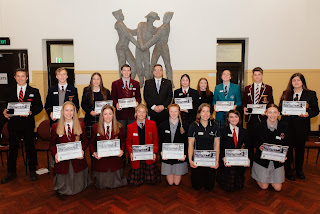How would I have I have felt if I were there?
If I was in Darwin on the 19th of February 1942 by Charlotte Lockwood
Throughout the trip I would think of questions as to if I
was in Darwin on the 19th of February 1942. How I would have felt if I were
there? How would I have felt if I were on the Neptuna as I was getting bombed?
How would I have felt if I saw the enemy planes flying over and bombs falling
from the sky? How would I have felt if one of my family members was lost in the
bombing?
On the final night, we went to the gun from the Peary and
looked out over the harbour. This moment had a large impact on me because it
signified how much we had learnt on the trip. On the first day, we did the same
thing stood at the gun and looked over the harbour, but it wasn’t very
impacting because we didn’t know much. That final night looking out I was able
to answer so many of the questions I had thought to myself throughout. How
would I have felt if I was there? I would have been terrified. Seeing the bombs
falling, shrapnel flying, the anguish, distress, and destruction.
At the royal flying doctor’s Museum, there was a VR
experience that took you through Darwin Harbour as it was being bombed. It put
you on the Neptuna as it was being blown up, in a plane shooting down the enemy
and, on the wharf, watching the destruction occur. How would I have felt if I
was on the Neptuna as it was getting bombed and seeing the enemy planes
dropping bombs? I would have felt unprepared and frightened, but I believe that
I would have also felt content knowing that I was going to die fighting for my
country in my country.
I think that I can safely say that visiting the Adelaide
River War Cemetery largely impacted everyone. The service person I researched
was Cecil Grant Cross who was an engineer who died when Neptuna got bombed. He
was 21. Although he has no known grave, he is commemorated on a plaque at the
cemetery. Although I am not related to him in any way, sitting at his memorial
impacted me because it was the moment in the trip when I realised that these
are all real people, with some of them only being one or two years older than
me when they died. Since he was so young when he died and only served for 11
months, there is very little documentation on him. The cemetery showed me the
importance of documenting the lives of those who fought for us because although
they may not have served for as long or have as many accomplishments as others,
they all sacrificed the same amounts to save us. How would I have felt if one
of my family members were lost in the bombing? Although I would have felt
devastated, broken and maybe even angry, I believe that I would have also felt
proud and a real sense of patriotism because I know how much they gave to fight
for us. I also believe that if I had lost someone in the bombing, knowing that
there was a group of 15/16-year-olds who were so enthusiastic about
commemorating those who were lost even though they didn’t even know them would
make me excited knowing that these stories won’t be forgotten.
This trip showed me how grateful I am to live in a country
who have such a strong defence force and allies. I am also grateful that we
have the opportunity to go on trips to learn about our history. All we had to
do to come on this trip was to write a biography to commemorate someone who
served us and from that, we got the opportunity to gain rare historical
knowledge and experience things most never will get to.




Comments
Post a Comment